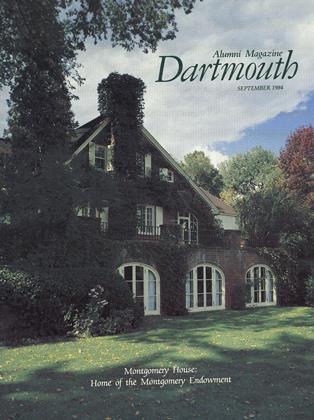Minimum Standards, the master plan for improving the College's fraternities and sororities, is shifting into high gear with this fall's house-by-house evaluation. In the wake of the adoption of Minimum Standards, administrators are expressing optimism about the fraternity system's future potential, while most house members are adopting a "wait and see" outlook.
Former Assistant Dean of the College Lee Levison said the standards have pushed the system to a point where "more and more students are becoming performance-oriented... people take some pride in the organization and the way it is managed." He said Minimum Standards is part of "an institutional commitment to the fraternity system ...putting a lot of energy, effort, and money into the system to improve it."
Interfraternity Council (IFC) President Chris Stoffel '85 said that house members are uncertain as to the effect Minimum Standards will have. "People aren't sure what's going to happen," Stoffel said. "No one's sure if this fall everyone's going to pass [the evaluation] or if the administration is going to get the axe out and start getting rid of fraternities."
Rob Thomson '86, IFC summer president, said, "We really can't tell until the evaluations come out in the fall. I think people feel that they [administrators] are dealing in good faith. They're definitely not trying to do away with the system. They're trying to fix it up, and it needs it."
Dean of the College Edward Shanahan agrees. "There has been a fair degree of skepticism... there is still that unknown. Minimum Standards does make them [fraternitites and sororities] responsible to the College." Shanahan added that time, however, is changing that attitude. As further dealings with fraternity members occur, he said that "many of their concerns are mollified."
Levison said that while the idea for a Minimum Standards-type plan has been around for several years, the present document took form in the winter of 1983 during an IFC self-evaluation. After a few months of student and administrator criticisms, the present standards evolved. They provide specific levels of performance for membership, leadership, budgeting, behavior, alumni relations, programming, and physical plants. Levison said one of the main goals is to provide a continuity that the Dartmouth Plan and the annual turnover of leadership tend to disrupt.
Presently, however, most of the attention is being given to the physical plants. Shanahan said all of the organizations satisfactorily met the July deadline for "priority one" improvements primarily meeting fire safety standards. Fraternities and sororities must also meet priority two (covering mainly structural repairs) and priority three (repairs dealing primarily with aesthetics) deadlines by January and June of 1985, respectively. When completed, these improvements would, according to Minimum Standards, "bring the fraternity and sorority system facilities to the level existing in the College dormitory system." Facilities audits completed last winter indicated that these improvements would cost an average of $50,000 per house, with a few houses requiring as much as $100,000 of work.
The high cost of these improvements has caused a few organizations to consider College ownership. Chi Phi fraternity, formerly Heorot, has already signed a letter of intent to sell to the College. Tim Ober '86, Chi Phi's summer-term president, said that faced with renovation costs of $119,000, the organization could not afford to meet Minimum Standards on its own. "We just don't have a choice," Ober said. "It's either College ownership or no recognition. I definitely would rather have stayed independent," he added, then said, "I guess in the long run, the house will be better off."
Ober said that the College will pay a nominal purchase price for the house and subsequently will pay for all improvements as well as ongoing upkeep. He said that the College has promised "to change the day-to-day life [of Chi Phi] as little as possible" and that the administration has "listened to us more than we thought they would."
At present two fraternities, Alpha Chi Alpha and Alpha Phi Alpha, occupy College-owned houses, as do the four sororities with houses, Kappa Kappa Gamma, Sigma Kappa, Alpha Chi Omega, and Kappa Alpha Theta. Still, members of the privately-owned houses in the system, by far the majority, cling to their independence. Most members view College ownership as a last resort. Thomson, for example, said that his fraternity, Phi Delta Alpha, "would avoid selling out at all costs."
On the other hand, Sue Wayne '86, acting president of Sigma Kappa, said her sorority has been very happy with College ownership. "They take care of all the financial arrangements, maintenance, mowing the lawn... which takes care of a large time commitment," Wayne said. "If we had the chance to be un-College owned, we wouldn't do it," she added.
Shanahan emphasized that Minimum Standards was not an isolated attack on the fraternities but is part of a larger effort to enhance residential life. "The intent is to revitalize the fraternity and sorority houses, as well as the dormi tories, in a way that makes them truly complementary to the curricular education students get at the College."
We trust the day is not far distant when our own Alma Mater shall welcome to her halls the fair daughters of Eve.... What plausible reason can be assigned for excluding the fair sex from our colleges, as though they were to be punished for the possession of so many natural graces?" —From Vol. I, No. ii, of The Dartmouth (February 1867)
 View Full Issue
View Full Issue
More From This Issue
-
 Feature
FeatureDennis Brutus Speaks Out
September 1984 By Kendal Price '78 -
 Cover Story
Cover StoryThe Montgomery Endowment Finds a Home
September 1984 By Shelby Grantham -
 Feature
FeatureRichard Eberhart at Eighty: The Long Reach of Talent
September 1984 By Jay Parini -
 Feature
Feature"Three ... Forty-two ... Hut"
September 1984 By Jim Kenyon -
 Feature
Feature"Innocent Ardor and Delight": A Tribute to Richard Eberhart
September 1984 By James Melville Cox -
 Article
ArticleRumblings On Fraternity Row
September 1984 By Fred Pfaff '85








